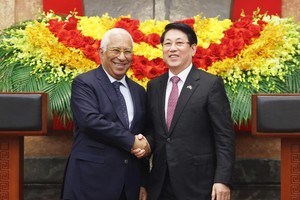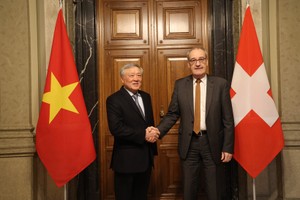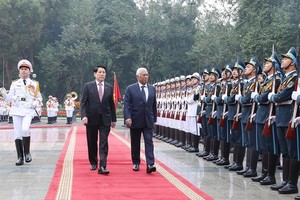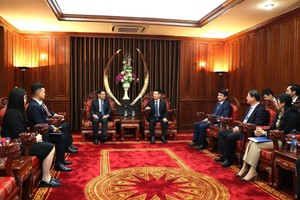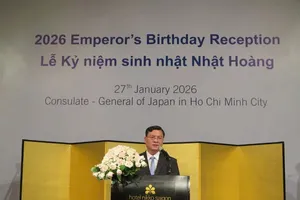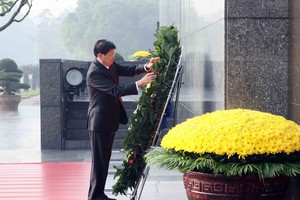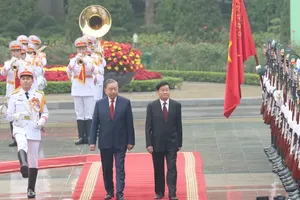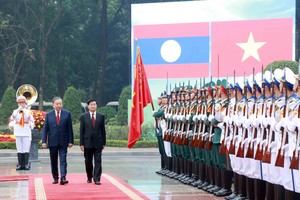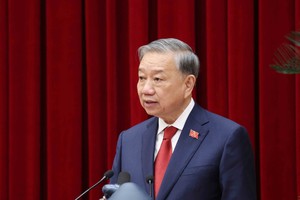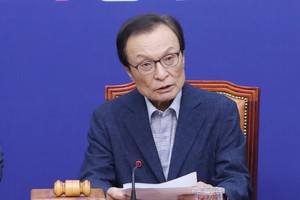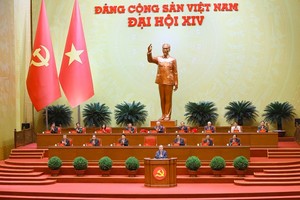AFP correspondent Giles Hewitt reports that intermittent snow continues to tumble on the road north from Sendai deeper into the tsunami-affected areas adding to the difficulties of rescuers.
- Temperatures overnight dropped below freezing. Snow ploughs are clearing the sides of roads and many cars are fitting snow chains on tyres.
- AFP colleagues further north reported having to dig their cars out of heavy overnight snow outside their hotel.
0423 GMT: An official with the Japanese embassy in Singapore told AFP that a Singaporean woman has donated Sg$1 million ($780,000), double the amount given by the Singapore government, to aid relief efforts in Japan.
- The million-dollar cheque from Elaine Low was handed over to Japan's ambassador to Singapore, Yoichi Suzuki, on Wednesday.
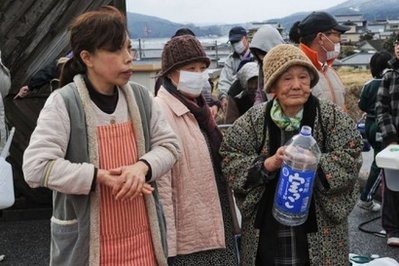
0415 GMT: The US State Department has authorized the voluntary departure of embassy family members in quake-damaged Japan, which is battling to avert a nuclear disaster.- "The Department of State has authorized the voluntary departure, including relocation to safe areas within Japan, for family members and dependents of US government officials," State Department official Patrick Kennedy said. "We have not ordered them to leave. We have made this opportunity available to them should they choose to exercise it," he added.
0355 GMT: Our Seoul bureau reports that scientists at the Korea Astronomy and Space Science Institute have said the massive earthquake tin Japan has shifted the country more than two metres away from the neighbouring Korean peninsula.
- The Korea Astronomy and Space Science Institute (KASSI) said the Korean peninsula moved east up to five centimetres (two inches) while Japan shifted some 2.4 metres (7.92 feet) east.
0350 GMT: Shares in China's nuclear energy firms have extended their losses after Beijing suspended approval of new projects in response to Japan's atomic crisis.
- Shenzhen-listed SUFA Technology Industry Co, a unit of state-owned China National Nuclear Corp, dropped 7.4 percent to 32.3 yuan ($4.9) mid-morning after falling the ten percent daily trading limit a day earlier.
0253 GMT: US President Barack Obama has offered to give Japan any support that it needs as it grapples with a nuclear crisis following a quake and tsunami, Japanese government spokesman Yukio Edano has said.
0250 GMT: Hideo Chiba, a baker in the devastated Japanese port town of Kesennuma, told our correspondent Hiroshi Hiyama: "Whatever will be, will be." He firmly believes that hard work can be uplifting, so the 70-year-old has busied himself with a smile, cleaning up his house and shop ravaged by the killer tsunami.
"People say 'How can you smile like that?' I just tell them, 'None of my relatives died.'"But he added: "We don't know when we will receive power and water and telephone service. It's hard for me to decide when or whether I will be able to reopen."
"I don't have fresh water to clean my hands. But I will go on."
0235 GMT: Nariman Behravesh, an economist at US-based IHS has told AFP that a the disaster will have a "large, but -- probably -- temporary impact on the Japanese economy," and a "small impact on the rest of the world".
- The tens of billions of dollars that will be spent rebuilding homes, factories and infrastructure could spark a recovery boom.
- With 11 nuclear plants shuttered and blackouts predicted until the end of April, a slowdown in Japanese production could quickly turn into a manufacturing bottleneck. "People will be surprised by how fast prices will rise," Jesse Toprak, an auto analyst with TrueCar.com told AFP.
Experts are cautiously optimistic that the still-brittle global economy can absorb the shock of Japan's triple disaster, but major risks still loom as the crisis unfolds.
0230 GMT: US officials have warned citizens living within 50 miles (80 kilometers) of a crippled Japanese nuclear plant to evacuate or seek shelter. The evacuation order came as the chairman of the US Nuclear Regulatory Commission (NRC) warned there was no water left in the spent fuel pool of reactor 4 at the Fukushima nuclear plant, resulting in "extremely high" radiation levels.
0225 GMT: Tokyo shares ended the morning session down 2.09 percent Thursday as a surging yen added to fears about the economic fallout from a huge earthquake and nuclear power plant troubles.
0220 GMT: AFP's Seoul bureau reports that South Korean pharmacists have issued an appeal cautioning against panic over feared radiation exposure from Japan's quake-hit nuclear plants, as callers flooded drug stores with requests for iodide pills.
- Fears over radiation spread through the Internet and text messages, prompting Seoul to launch a crackdown on scaremongering, as officials insisted that constant westerly winds will blow radiation out into the Pacific.
0212 GMT: The power supply to a quake-damaged Japanese nuclear plant northeast of Tokyo could partially resume later Thursday, the country's nuclear safety agency said, according to Kyodo News.
0145 GMT: Britain's Daily Telegraph has reported that the International Atomic Energy Agency (IAEA) had warned Japan two years ago that a strong earthquake could pose a "serious problem" for its nuclear power stations.
- An IAEA expert expressed concern that the Japanese reactors were only designed to withstand magnitude 7.0 tremors, according to a December 2008 US diplomatic cable obtained by the WikiLeaks website, the Telegraph reported.
0130 GMT: Britain has advised its citizens to consider leaving Tokyo and northeastern Japan following the earthquake and the subsequent explosions at the Fukushima nuclear facility. The Foreign Office said British officials report there is still "no real human health issue that people should be concerned about".
0050 GMT: Television images have shown a Japanese military helicopter sumping water Thursday from a huge bucket onto the stricken Fukushima nuclear power plant. NHK also reports that more helicopters will be sent to douse the plant.
0030 GMT: Japanese shares slumped more than four percent in early trade Thursday as the yen hit its highest level against the dollar since World War II.
0020 GMT: Our Tokyo bureau reports that the Bank of Japan today has pumped five trillion yen into the financial system to soothe money markets.
0000 GMT: A new day dawns in Japan, and the AFP live report is resuming.
